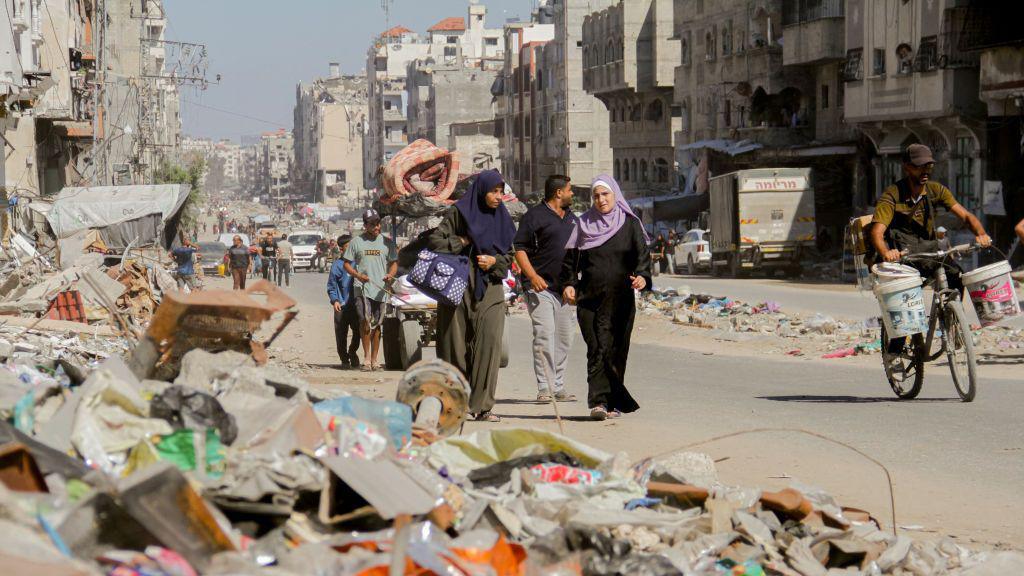Israeli air strike on north Gaza school kills at least 22, medics say

Tens of thousands of Palestinians have fled Jabalia and other areas of northern Gaza in response to an Israeli ground offensive
- Published
At least 22 people have been killed and dozens wounded in an Israeli air strike on a UN-run school sheltering displaced families in northern Gaza, local medics and the Hamas-run Civil Defence agency say.
The director of a local hospital said children and women were among the casualties from the attack on Abu Hussein Primary School for Boys in Jabalia refugee camp.
Video footage showed people carrying a number of casualties and fetching buckets of water in an attempt to put out a blaze inside a tent.
The Israeli military said it had “conducted a precise strike on an operational meeting point for Hamas and Islamic Jihad terrorists”.
It also named 12 men who it said were among “dozens” of members of the Palestinian armed groups present in the compound at the time of the strike.
The military accused them of being involved in rocket attacks on Israel and of carrying out attacks on Israeli troops in Gaza in recent days.
Hamas rejected the allegation that the school was being used for military purposes as “mere lies” and part of a “systematic policy of the enemy to justify its crime”.
The director of the nearby Kamal Adwan hospital in Beit Lahia, Dr Hussam Abu Safiya, told the BBC in a voice note that about 25 people were killed and 75 injured in the strike, and that children and women were among the casualties who had been brought there.
"Our hospital is small in size and we cannot receive all these injured people. Most of the people presented to us were women or children," he said.
The town of Jabalia and its refugee camp have seen intense Israeli bombardment and fierce fighting on the ground since the Israeli military launched a ground offensive 12 days ago to target what it said were Hamas fighters regrouping there.
More than 50,000 people have fled their homes in response to the hostilities and Israeli evacuation orders, but UN officials say there are tens of thousands who are stuck there in increasingly desperate conditions with water and food running out.
Kamal Adwan hospital, along with the nearby Indonesian and al-Awda hospitals, are facing dire shortages of fuel and other supplies, according to the UN.
"We are working under fear, under the sound of explosions everywhere. We have a big challenge in our hospital," Dr Abu Safiya said.
"We have a lack of medicine, a lack of medical supplies, a lack of medical equipment. We don't have enough staff, especially specialists for our ER."
For the first two weeks of this month, the UN said no humanitarian supplies entered northern Gaza from Israel’s crossings.
Aid lorries began to go in this week after a sternly worded letter was sent by the Biden administration, warning Israel that if it did not increase aid getting into Gaza within 30 days it risked losing US military assistance.
Israel said it was not preventing the entry of humanitarian aid and accused Hamas accused of hijacking and stealing aid deliveries - something the group has denied.
On Thursday, a UN-backed assessment warned that “the risk of famine persists across the whole Gaza Strip”, adding: “Given the recent surge in hostilities, there are growing concerns that this worst-case scenario may materialize.”
The report by the Integrated Food Security Phase Classification (IPC), external said about 1.84 million people were experiencing high levels of acute food insecurity, with 664,000 of them facing “emergency” levels of hunger and almost 133,000 facing “catastrophic” levels.
The last figure is three-quarters lower than at the time of the last report in June - a fall the IPC attributed to a temporary surge in humanitarian assistance and commercial supplies between May and August.
However, the IPC said it expected the number of people facing “catastrophic” hunger to nearly triple in the coming months because there had been a sharp decline in aid deliveries and food availability since September.
In response to the report, UN Secretary General António Guterres said on X: “Famine looms. This is intolerable. Crossing points must open immediately, bureaucratic impediments must be removed, and law and order restored so UN agencies can deliver lifesaving humanitarian assistance.”
Israel launched a campaign to destroy Hamas in response to the group's unprecedented attack on southern Israel on 7 October 2023, in which about 1,200 people were killed and 251 others were taken hostage.
More than 42,430 people have been killed in Gaza since then, according to the territory's Hamas-run health ministry.